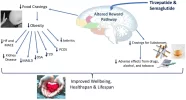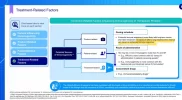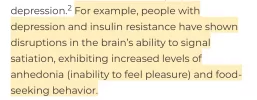I'll add this regarding the psychological impact. Initially it was proposed a suicide warning be put on the box of Ozempic/Wegovy, but research showed less of a risk than the general population, not more.
Yet there's still conflicting data showing increased and decreased rates of depression. I suspect what's happening is that the sudden loss of food as a reward, from the appetite suppression, occurs before the brain adjusts to no longer need the dopamine hit. So you can't eat, but still feel one of the primary drivers that people experienced causing them to eat. That is, eating relieved depression with a dopamine hit.
Then in time, the brain adjusts, the "addiction" lifts, and along with all the other benefits of weight loss, lessened inflammation, greater mobility, and improved satiety in many things, mood improves, depression lifts, and suicide risk drops below the non-GLP using population.
At least that's what the data seems to suggest. An initial increase in depression(for some who were already depressed and medicating with food), then as time goes on, a steady improvement.









